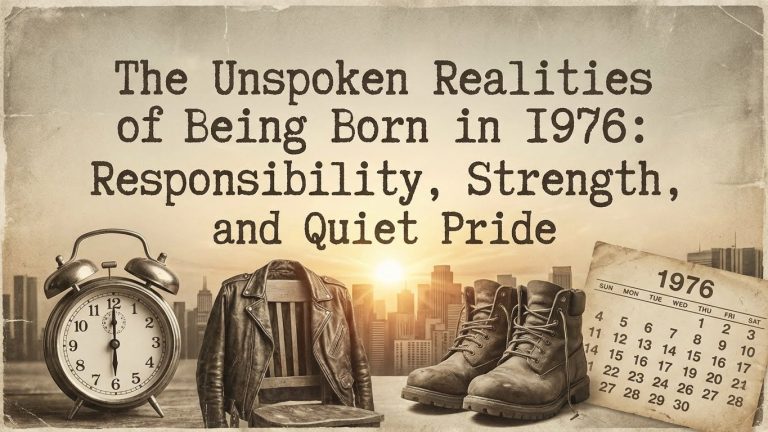“You’re not lazy. You’re just overwhelmed, overstimulated, and emotionally exhausted.”
If you’ve ever sat down to work and found yourself:
- Scrolling social media without meaning to
- Re-reading the same paragraph 3 times
- Procrastinating on even simple tasks
- Feeling mentally foggy all day…
…you probably told yourself the same thing:
“What’s wrong with me?”
“Why can’t I focus like everyone else?”
“Am I just lazy?”
Let’s get something clear right now:
You are not lazy.
You are likely battling a focus system that’s been hijacked by modern life, emotional load, and (possibly) even trauma.
This isn’t about willpower.
It’s about wiring.
🔍 The Lie of Laziness: Why We Blame Ourselves
In a productivity-obsessed world, doing more = being better.
So when we hit a wall or lose focus, we instantly internalize it:
“If I were more disciplined, I’d get it done.”
But laziness is often just a label we slap on invisible struggles like:
- Mental fatigue
- Unprocessed emotions
- Anxiety or ADHD
- Lack of clarity or purpose
- Constant overstimulation
- Burnout
Most people aren’t lazy. They’re drowning in input and don’t know how to process it.
⚙️ Why Focus Is So Hard Now (It’s Not Just You)
We live in an age where everything is fighting for your attention — and most of it is louder than your own thoughts.
Let’s break down the real culprits behind your “laziness”:
1. You’re Mentally Overstimulated (Thanks, Internet)
Your brain was never designed to handle:
- Constant notifications
- Endless scrolling
- Multitasking 12 tabs at once
- Binge content + background noise
Each of these things delivers tiny dopamine hits, training your brain to chase stimulation — not focus.
Focus feels boring compared to TikTok. That’s not your fault. That’s neurology.
2. Your Brain Is on Alert Mode (Hello, Anxiety)
An anxious brain doesn’t want to focus — it wants to scan for danger.
Even subtle anxiety (like worrying about bills, work, or relationships) keeps your mind in “fight or flight”. That means:
- You can’t settle into deep work
- Your attention keeps jumping
- You feel tired after simple tasks
You’re not distracted because you’re weak.
You’re distracted because your brain is trying to protect you.
3. You’re Emotionally Exhausted
Focus requires emotional safety.
But most of us are carrying:
- Unprocessed grief
- Unresolved guilt
- Self-doubt or imposter syndrome
- Emotional labor from family or work
You can’t expect your mind to concentrate when your heart is full of chaos.
You’re not lazy. You’re tired — in ways no one can see.
4. You’ve Trained Your Brain to Avoid Discomfort
Let’s be honest: modern life is a buffet of instant gratification.
We can:
- Order food in 2 clicks
- Skip boredom with a scroll
- Avoid tough tasks with endless tabs
Every time we avoid discomfort, we reinforce that escape is easier than effort.
Over time, this becomes default.
5. You’re Lacking Clarity, Not Motivation
Focus isn’t just about discipline — it’s about knowing what matters.
If your to-do list looks like:
✅ Everything
❌ Nothing specific
Then of course you’ll avoid it. The brain resists vague effort.
The more clarity you have, the less motivation you need.
✅ How to Reclaim Your Focus (Without Guilt, Shame, or Hustle)
Now that we’ve exposed the real reasons behind your struggle, let’s shift to solutions.
These aren’t “quick hacks” — they’re mindset shifts and behavior patterns that actually work.
1. Stop Calling Yourself Lazy. Period.
Labeling yourself as lazy is like pouring gasoline on a fire.
It adds shame, which further destroys focus.
Instead of judgment, try curiosity:
- “Why is my brain avoiding this?”
- “What’s actually making this feel hard right now?”
- “What would this look like if it were easier?”
Compassion is fuel. Shame is friction.
2. Use “Focus Anchors” — Not Willpower
Set up your environment to make focus the default:
- Clear workspace → fewer visual distractions
- Put your phone in another room → remove the temptation
- Use music or white noise → signal to your brain it’s focus time
- Set a timer for 10 minutes → lower the entry barrier
Don’t wait to feel ready. Create conditions that make focus easier.
3. Break Tasks Down to “Stupid Simple”
Your brain avoids overwhelm. So help it out.
Don’t write “Finish report.”
Write:
- Open document
- Write 3 bullet points
- Expand one section
Momentum beats motivation. Every time.
4. Try the “Tiny Promise” Method
Pick one small, easy win per day and commit to it fully.
Examples:
- “Today, I’ll write 100 words.”
- “I’ll walk for 5 minutes.”
- “I’ll reply to just one email I’ve been avoiding.”
Small wins rebuild trust in yourself — and trust fuels sustained focus.
5. Learn to Tolerate Boredom
Focus feels boring compared to instant dopamine.
So practice boredom like a skill:
- Sit in silence for 2 minutes
- Do one task with no music/podcast
- Stare at the ceiling instead of your phone
This retrains your brain to be okay with less stimulation — and opens space for deep work to return.
6. Address the Emotional Load You’re Carrying
Ask yourself:
- What’s emotionally heavy right now?
- Have I been honest about my stress or feelings?
- Is my brain avoiding work because my heart is exhausted?
Sometimes the most productive thing you can do is feel what you’ve been suppressing.
7. Move Your Body, Reset Your Brain
Focus is not just mental. It’s physical.
Movement:
- Clears brain fog
- Reduces anxiety
- Boosts mood
- Improves blood flow to the prefrontal cortex (your focus HQ)
You don’t need a full workout.
Stretch. Walk. Breathe. Reset.
8. Accept That Some Days Will Suck — And Keep Going Anyway
The goal isn’t perfect focus.
It’s to build resilience around imperfection.
If you have an off day:
Don’t spiral. Don’t self-punish. Don’t quit.
Just:
- Take a break
- Reset expectations
- Start small again tomorrow
Progress is built on grace, not punishment.
💬 Final Thought: You’re Not Broken. You’re Human.
Your ability to focus doesn’t define your worth.
You’re living in a world designed to distract you, with a nervous system that may still be recovering from years of stress, disconnection, or survival mode.
And yet — here you are. Still trying. Still showing up. Still curious about change.
That’s not laziness.
That’s courage.
So the next time you struggle to concentrate, skip the guilt. Ask yourself instead:
“What does my mind need right now — and how can I meet it halfway?”
Because you’re not lazy.
You’re just ready to work with your brain — not against it.











